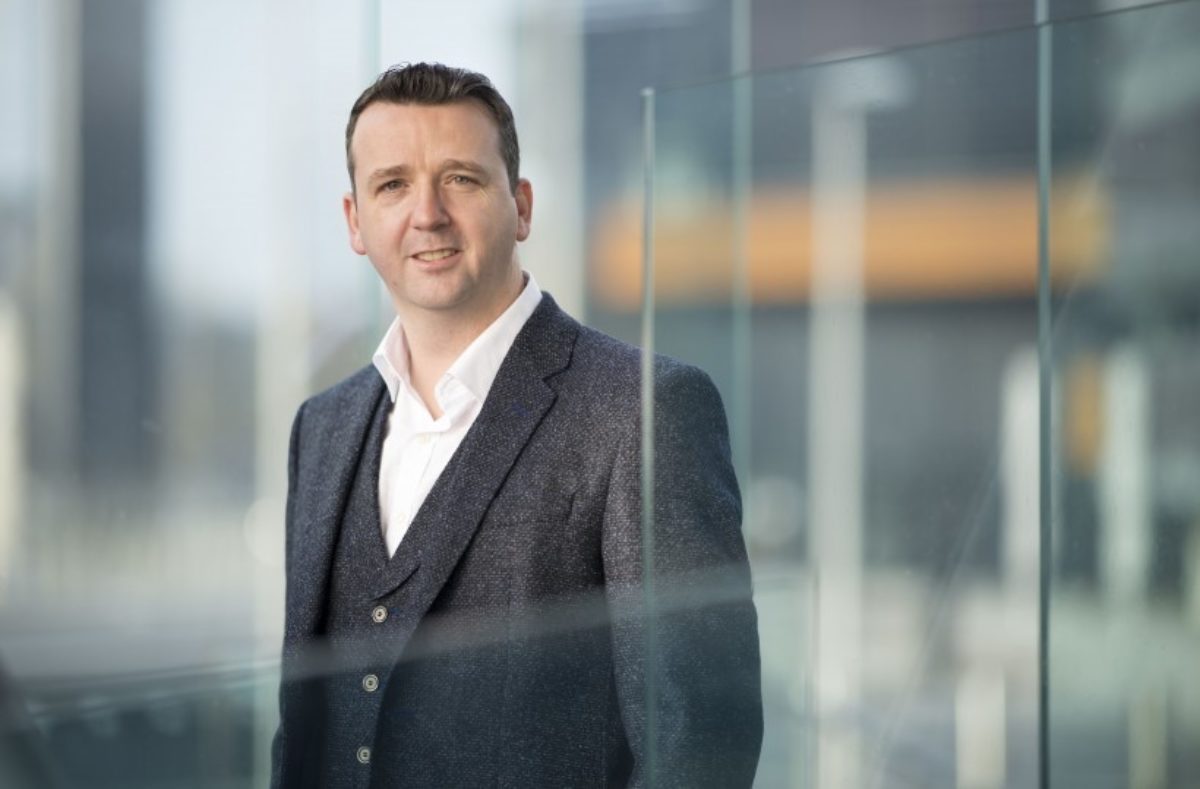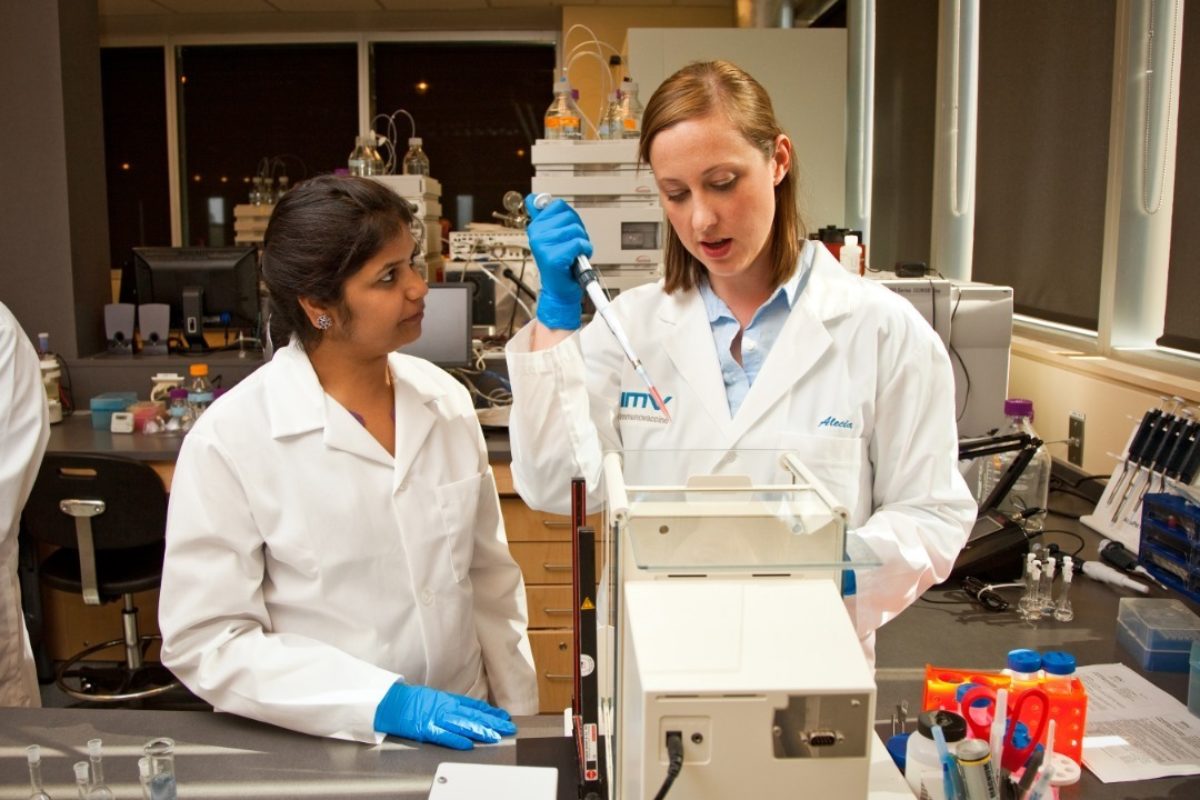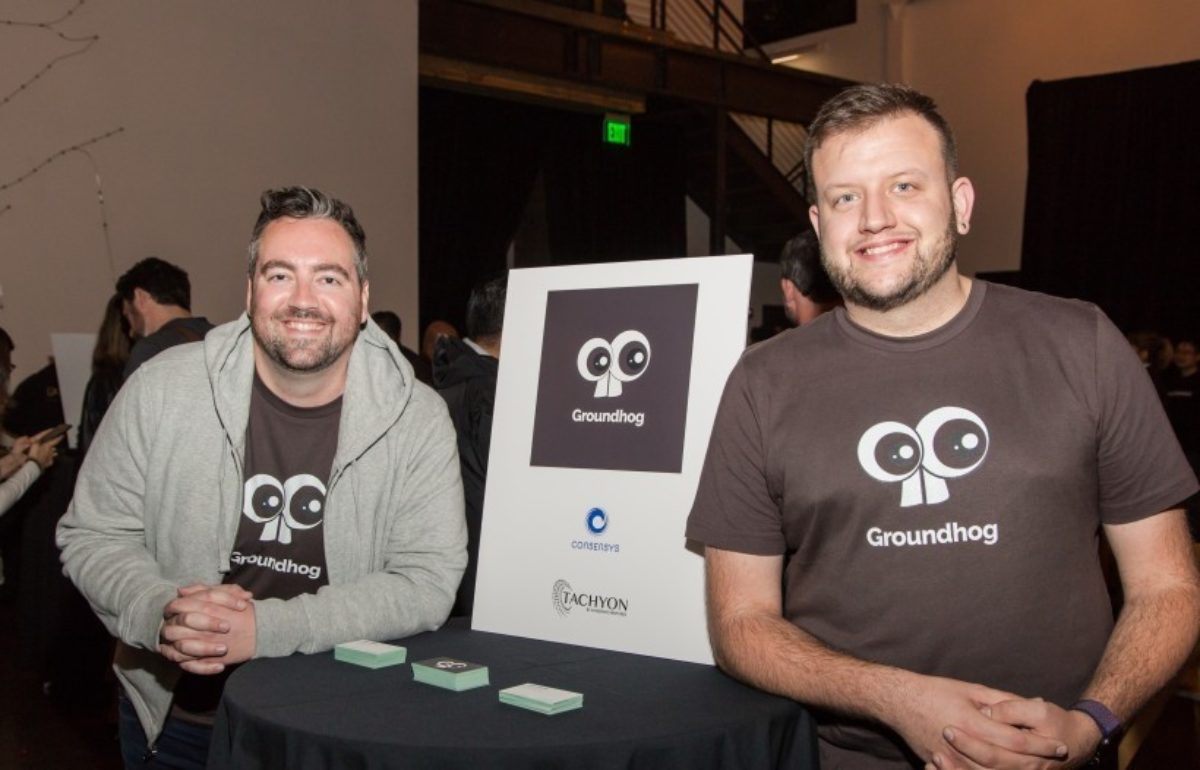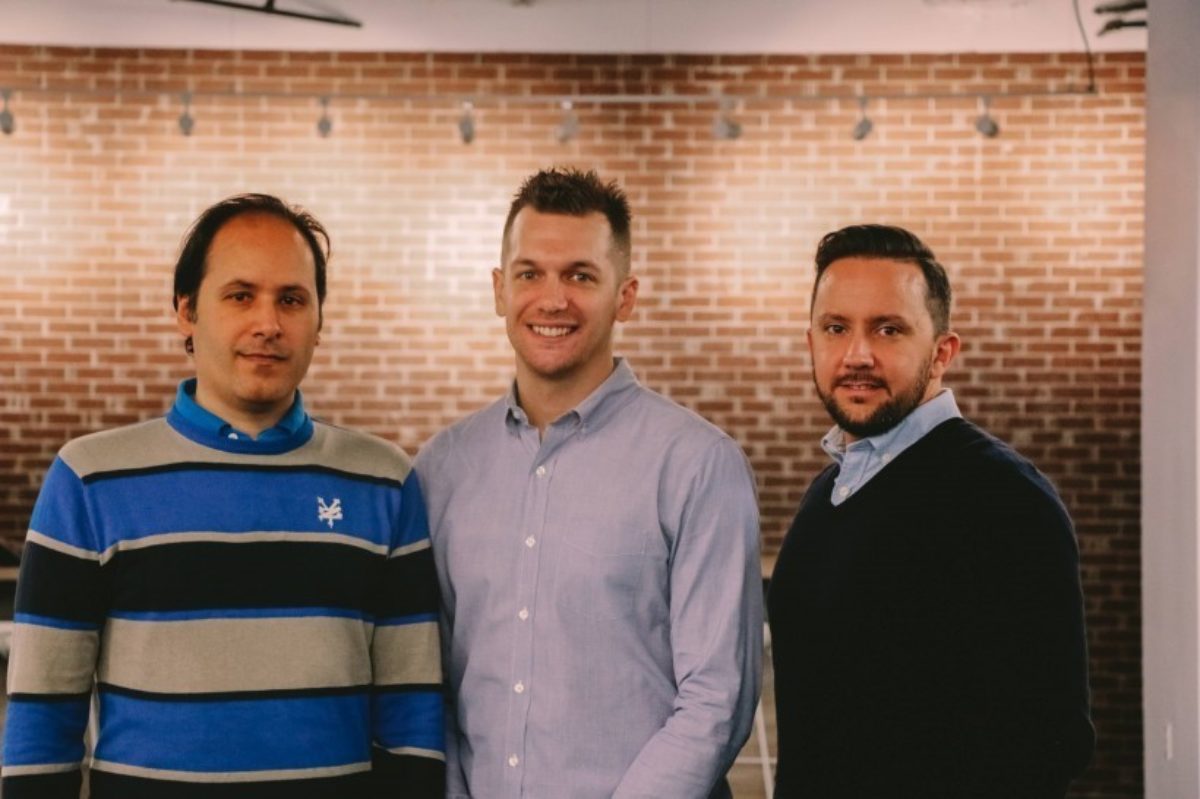Life Sciences Industry Continues to Grow
August 6, 2020
By Carol Moreira
In July, the life sciences industry in Halifax continued to see strong growth, fuelled by innovative ventures that are combatting COVID-19.
There were also advances in the oceantech ecosystem in July, and several IT companies announced significant milestones. But the big news in the Halifax Innovation District was in biotech, especially the impressive rise of publicly listed Sona Nanotech.
Sona traditionally makes gold nanoparticles for use in diagnostic testing. It has adapted its technology and is now developing an inexpensive, rapid test for COVID-19 and other diseases. The company’s shares, which are listed on the Canadian Securities Exchange, skyrocketed after clinical trials demonstrated its testing product has a 96 percent sensitivity to the COVID-19 virus.
The company said its test gives quicker results, is cheaper, and requires less complex equipment than others.

“This [testing kit] will allow expansion of testing by governments, help ease the burden on healthcare systems, keep healthcare workers safe by allowing them to know their status on a daily basis, and assist in softening restrictions by providing a quick and simple means to screen individuals,” President and Chief Scientific Officer Darren Rowles said in a statement.
Sona will seek a listing on the NASDAQ exchange in New York, which will give it greater exposure to American capital markets. It also named a new CEO and company strategic adviser David Regan.
The company’s shares began the year at 11 cents. By the end of July, they’d reached $14.45, meaning they had risen 13,000 percent this year and the company has a market value of $775 million.
Greater Collaboration to Boost Life Sciences
The strength of the Halifax biotech sector was highlighted by Scott Moffitt, Executive Director of life sciences industry group BioNova, who noted in an interview with Entrevestor the number of companies making great progress.

Appili Therapeutics, which focuses on curing infectious diseases, has raised $27 million this year. And, after recently raising $25 million, immune-technology company IMV’s shares surged 63 percent in July, valuing IMV at $424 million.
Moffitt said up-and-coming companies include Densitas, which makes software that gauges breast density during mammograms, Adaptiiv Medical Technologies, which allows 3D printing of specialized boluses for cancer treatment, and medical device company ABK Biomedical, which raised US$30 million (C$40 million) in venture capital in 2019.
“What we’re seeing now is the culmination of a lot of years of a lot of hard work,” Moffitt told Entrevestor. “We’ve got to the point where we can really pump out high quality companies quickly.”
The sector’s growth is in line with projections outlined in BioFuture 2030, the report BioNova released in 2018.

Calling for greater collaboration in the sector, Moffitt welcomed the Nova Scotia Health Authority’s increasing involvement with startups. NSHA could not only serve as an early adopter for local startups but could also provide the validation they need for sales in other jurisdictions.
Another long-time champion of the life sciences sector, Innovacorp investment manager Lidija Marusic joined the board of the Canadian Venture Capital and Private Equity Association, which represents Canadian institutional startup investors.
Marusic said she will use the role to advocate for the region. She thinks the region’s VC funding may be lagging, especially for life sciences companies. She said most of the ventures she works with have to look elsewhere for multi-million dollar raises.
She said Build Ventures, which helps fund mature companies, sometimes avoids ventures that need lengthy regulatory processes, which typically includes life sciences companies.
Marusic proposed a venture capital fund focused on funding life sciences ventures.

Dalhousie Computer Science Grads Rise
The number of students graduating from Dalhousie University’s Computer Science program has increased by more than 25 percent over the last year because of rising enrolment and a growing demand for technical talent. The Faculty of Computer Science awarded more than 260 degrees at its recently held convocation -- a 26 percent increase over winter 2019.
The undergraduate and graduate degree-holders will not struggle to find work; IT companies and those in other fields are all hiring programmers and developers. Last year, the Atlantic Provinces Economic Council issued a report into the tight labour market for tech talent, anticipating that Atlantic Canadian employers would hire about 2,000 IT professionals each year.
“There’s a dynamic where you grow the [talent] pool, and it satisfies your demand,” said Computer Sciences Dean Andrew Rau-Chaplin. “But it also creates more demand by attracting more companies and more growth in the companies that are here, which is great for Nova Scotia.”
Dalhousie is also recruiting more women. In November 2018, the university announced it had increased the number of women enrolled in computer science programs by 144 percent compared to 2016. This has been achieved partly by offering an extra $320,000 of scholarship funding to women.
Historically, graduating classes have been almost entirely male but the latest class was 30 percent female.
News in Halifax’s Start-up Ecosystem
Groundhog Sues US Accelerator
Groundhog, a company developing technology that facilitates recurring cryptocurrency payments, is suing the parent company of California-based accelerator Tachyon. The suit alleges breaches of contract and theft of trade secrets.
Groundhog, which is incorporated as BlockCrushr Labs, was part of Tachyon’s fall 2018 cohort. It received US$100,000 (C$135,000) in investment from Tachyon’s owner ConsenSys Inc.

The lawsuit claims Tachyon used its access to BlockCrushr’s corporate secrets to launch a competing product before the Canadian company could launch its own product. The company also claims Tachyon failed to help it secure investment, forcing it to lay off staff, despite previously raising US$500,000.
The lawsuit will ask for an injunction to stop the competing company, Daisy Payments, from profiting from Groundhog’s trade secrets. Groundhog will also claim punitive damages and a trust to “disgorge” Daisy’s profits.
Novagevity Launches Plant-Based Drinks
Novagevity closed an angel funding round and borrowed $300,000 from the Atlantic Canada Opportunities Agency prior to launching its plant-based nutritional drinks. The company produces organic meal replacements made in Canada under the name Sperri. The company was founded by experienced life sciences entrepreneurs Mary Lynch and Gregg Curwin.
“We know that, whether you’re unwell or well, high-quality plant nutrition can really help you get healthy and stay healthy,” said Curwin.
Curwin and Lynch will pilot the drinks in August and launch in September. They plan to sell through their website and target health-related institutions.
Talkatoo for Vets
Talkatoo is catering to veterinary professionals with a new Apple-based version of its dictation software. The venture has raised a $400,000 round of funding from existing investors, including Halifax VC group Concrete Ventures.
“We now have just under 200 users, and we’re actually starting to experience really rapid growth,” Wilkie told Entrevestor. “We’ve just completed our most rapid growth of any month since COVID started.”
Talkatoo’s Software-as-a-Service voice-recognition product allows veterinary professionals to dictate notes that are then transcribed. The venture plans to eventually expand to cater to other professions.
The company is taking advantage of a huge opportunity, Wilkie said, as last year, Nuance Communications, the world’s largest provider of voice-recognition software, stopped developing for Apple computers.
Cribcut Becomes Bright
Cribcut, known for offering haircuts and beauty services at offices, has rebranded itself as Bright and added new products that corporate clients can offer employees, such as classes on personal wellness.
Bright’s services will still be sold to employers so they can be included in employee benefit packages, but classes have moved online due to the pandemic. CEO David Howe said the change was planned before the pandemic, but the haircut business collapsed when lockdowns were enforced, so the team changed its timeline.
“We want to be the company that, whether you work from home, work from the office or some combination of both, we have perks and amenities that you can offer your team,” Howe said.

vLife Supports Local
Social enterprise vLife, which helps users support small, local businesses in Atlantic Canada, has rolled out the paid version of its service.
The platform allows users to sign up for free and search for local businesses. VLife directs users to a website or storefront.
CEO Melanie Little said vLIfe helps businesses that can’t access the same marketing infrastructure as franchises and chains. vLife also develops site listings for client companies at no extra cost.
vLife chose to focus on local businesses because of their belief in the “triple bottom line”, meaning people and planet are as important as profit.
“Because we have a growing number of ‘buy local’ and ‘experience local’ followers, you’re going to get a more engaged lead than you would typically on a Facebook ad, for example,” Little told Entrevestor.
Charcoal Offers Programmatic Ads
Charcoal Marketing and Toronto’s Sugar Estate Media have created a digital media trading desk that allows Charcoal’s clients to access programmatic advertising – advertising which automates the process of buying digital media via software, relying on algorithms to deliver the right ad to the right website at the right time.
The trading desk will permit SMEs to access programmatic advertising on leading digital platforms, including Amazon, Google and Verizon, and social media platforms such as Facebook, Instagram, and Twitter.
“An independent trading desk is a great equalizer for small businesses, who can now access the digital media networks that were once only available to big spending brands,” said Charcoal CMO Mike Hayes.
Modest Tree Aids Auto Security
Modest Tree, a specialist in augmented and virtual reality training for manufacturers, has gained the internationally recognized Level 2 TISAX (Trusted Information Security Assessment Exchange) certification for use in the auto industry.
In a statement, the company said the certification recognizes its strength in protecting the secure exchange of sensitive automotive manufacturing information across industry segments.
“Modest Tree is now well-positioned to further accelerate the global use of immersive learning and marketing technologies across the automotive supply chain,” said Sam Sannandeji, Modest Tree CEO.
Investment Boost in Oceans Sector
Dal News reported that The Ocean Tracking Network (OTN) received a grant of $13.4 million from the Canada Foundation for Innovation’s Major Science Initiatives (MSI) Fund. The federal government has now awarded the Dalhousie-based group $27 million. OTN is the only MSI-funded national research facility in the region, Dal News said.
“This investment from CFI will allow OTN to continue serving its Canadian and international research communities - a network of 600 researchers and counting - who use OTN's infrastructure and data systems to track and analyze animal movements in the face of changing marine ecosystems,” said Dr. Sara Iverson, OTN’s Scientific Director.
OSC Funds $29M Ocean Project
Canada’s Ocean Supercluster has unveiled a $29 million initiative that uses artificial intelligence to monitor the health and movement of fish stocks and forecast their behaviour. The Ocean Aware initiative will receive $13.74 million from the Canadian government through the regionally located supercluster, with the remainder coming from private industry.
One of five federally supported superclusters that co-fund R&D with industry, the Ocean Supercluster was formed in 2018. It will spend $125 million of government funds in supporting $350 million worth of R&D over five years. Ocean Aware is the third project the group has announced.
Local businesses supporting the project include Emera, Nova Scotia Power, Irving Shipbuilding, Dartmouth Ocean Technologies and Xeos Technologies. Dalhousie University is among the institutions involved.
The focus will be on designing sensors that can be attached to fish or located in marine environments, allowing the transmission and storage of data and the creation of AI software capable of visualizing and predicting fish behaviour. It’s intended the new technologies will help in managing the health of farmed fish.
Cleantech Companies Get Federal Funding
Two Halifax companies were among 17 Canadian ventures to receive federal government funding through Sustainable Development Technology Canada’s seed fund.
Betakit said the selected ventures receive between $50,000 to $100,000.
The Halifax companies include Reazent, which makes organic replacements for agrochemicals. Its products assist with crop yield growth, disease control, and abiotic stress resistance in the agricultural industry. The startup was nominated by the Verschuren Centre.
The second venture, ReelData, is developing artificial intelligence and computer vision software for aquaculture, providing fish farms with real-time metrics. The startup aims to cut fish feed and mortality by tracking metrics such as fish health, hunger, and weight. ReelData was nominated by Innovacorp.